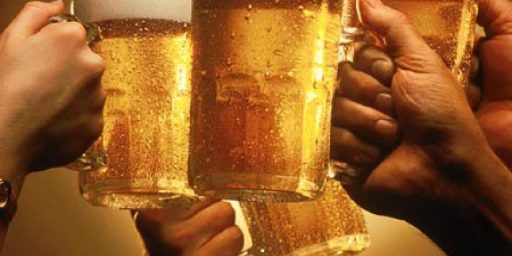73rd Anniversary of the End of the War on Booze
Steve Verdon
·
Tuesday, December 5, 2006
·
11 comments
Seventy three years ago today the War on Alcohol was finally called off. What did the War on Booze give us? How about an increase in organize crime, and hence crime itself. Not that I expect this to make any difference in the War on Drugs.
In any event, like Ronald Bailey I shall be drinking a glass of Lagavulin tonight to toast the anniversary (not that I really need a special reason to drink Lagavulin).

About Steve Verdon
Steve has a B.A. in Economics from the University of California, Los Angeles and attended graduate school at The George Washington University, leaving school shortly before staring work on his dissertation when his first child was born. He works in the energy industry and prior to that worked at the Bureau of Labor Statistics in the Division of Price Index and Number Research. He joined the staff at OTB in November 2004.






Yes, Lagavulin and heroin are EXACTLY the same and laws that outlaw both should be compared in the same way.
Steve,
You know, the same way that prohibition was repealed is available to stop the war on drugs. Contemplate that as you sip your scotch whisky (personally I prefer a bourbon whisky like Old Weller or Maker’s Mark).
YAJ,
Yes, but it is the attitudes of Director Mitch’s that are the problem. The idea that heroin is a great danger to society and that we should be making sure people do (or don’t do) what we think they should is what will keep the WoD going. A person can ruin their life with demon rum, but demon heroin, why the State has got to intervene!
How romantic! Steve, you and Ron might want to IM Mark Foley for a real good time! He apparently likes booze and boys too!
Steve,
My point was that if you disagree with the war on drugs, a constitutional amendment is certainly a way to stop it. Of course, that is not an easy path.
Personally, I am between the two camps here. I think the war on drugs, like prohibition, has filled our prisons with people who otherwise wouldn’t have been there, provided a monetary incentive for murderous gangs to arise and have not actually stopped what it was intended to stop. On the other hand, there is a world of difference between heroin and rum (much less so between marijuana and rum). While both can mess up your life, cause health problems and lead to addiction, heroin is much worse on all three of those counts.
And if you look at the amount of underage drinking, its pretty hard to say that the lure of the forbidden can effectively be legislated against. The number of people who reach 21 who haven’t had a drink is probably higher than it would have been with out the drinking age laws, but not to much higher and the abuse drinking (e.g. binge drinking) is probably much higher.
I support the war on drugs as much because it is the law in effect and that the opponents don’t seem to propose more than abolishing the prohibitions on drugs, but not taking into account the potential impact of legalized drugs. Some examples would be extended sentences if you commit a crime while drunk or using drugs. Imprisonment for failing to pay an emergency room debt if the visit was directly or indirectly associated with drugs or alcohol. I am assuming that there would be some sort of age limit associated with the legal purchase of drugs, though as the alcohol drinking age limits that may not be very effective. But lets assume that liquor stores would be able to sell cocaine alongside their single malt scotch and 7/11 would be able to sell marijuana alongside the Budweiser.
And that would just leave the question of addiction. I’m not sure how you would go about handling the unintended consequences of addiction to drugs.
But I think the public process of a constitutional amendment is the best way to hash out the public policy debate on legalizing drugs. Because if you can get it through that process, it will be supported by a clear majority.
This day is a local holiday at my house.
Better stock up on the Lagavulin. I hear they’re not making any more (or that what they are making will become Johnny Walker Blue)…
Oh yeah – drugs are bad. Unless they’re not fun, then they’re ok.
Good lord where did you hear that rumor Billy? That is a scary, scary thought! Still I can’t find a thing about it on the web.
Percentage of people predisposed to alcoholism: about 5%
Percentage of people predisposed to heroin addicition: about 100%
Alcohol certainly destroys lives, but we as a society have decided that the benefits of alcohol – relaxation, socializing, increasing the pleasure of food – outweigh the costs.
There is no tradeoff for heroin.
Local liquor store owner told me last time I picked up a bottle – he’s a guy who knows his scotch, but I haven’t seen the price go up since he mentioned it, so it might’ve just been BS. I’m keeping my fingers crossed, anyway…
Percentage of people predisposed to try alcohol >> percentage of people predisposed to try heroin.
Seriously, so what that the addiction rate is much, much higher. Many, many more people drink alcohol. Most people are aware of the powerful addictive nature of heroin and its other ancillary dangers (e.g. HIV from sharing needles, over dose, getting some bad smack, etc.).
Okay, you flunk basic economics. Of course there is a trade off. When you decide to spend resources preventing people from using/abusing heroin you cannot use those resources for other activities. Standard definition of opportunity cost.
Further, given that many of these people are going to abuse some sort of chemical it isn’t at all clear that making a given drug illegal addresses the problem.